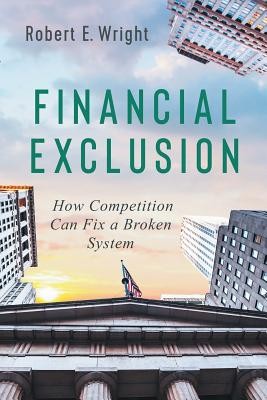
- We will send in 10–14 business days.
- Author: Robert E Wright
- Publisher: American Institute for Economic Research
- ISBN-10: 1630691704
- ISBN-13: 9781630691707
- Format: 15.2 x 22.9 x 2.6 cm, minkšti viršeliai
- Language: English
- SAVE -10% with code: EXTRA
Reviews
Description
Like mass incarceration and slavery, financial exclusion, discrimination, and predation serve the interests of the few at the expense of their direct victims and overall economic efficiency. Yet those banes persist, evolve, and even thrive because governments often foster them with one hand while ineffectually combatting them with another.
In Financial Exclusion, Robert E. Wright shows that America once ameliorated financial discrimination by leveraging the power of competition, allowing people who felt they were irrationally deprived of loans, insurance, or other financial services for reasons of ethnicity, gender, race, or religion to form their own financial institutions. Abandonment of that tradition for top-down government regulation in the 1990s led inevitably to the financial crisis of 2008. More regulation or direct government provision of financial services will not aid the those living in the hopeless, hungry side of town as much as a return to America's free market traditions will.
Robert E. Wright has served Augustana University as the inaugural Nef Family Chair of Political Economy since 2009. After receiving his Ph.D. in economic history from SUNY Buffalo in 1997, Wright taught economics at the University of Virginia and New York University's Stern School of Business. His 18 previous books include Mutually Beneficial, The First Wall Street, Financial Founding Fathers, One Nation Under Debt, Bailouts, Fubarnomics, Corporation Nation, Little Business on the Prairie, and The Poverty of Slavery.
EXTRA 10 % discount with code: EXTRA
The promotion ends in 23d.00:53:43
The discount code is valid when purchasing from 10 €. Discounts do not stack.
- Author: Robert E Wright
- Publisher: American Institute for Economic Research
- ISBN-10: 1630691704
- ISBN-13: 9781630691707
- Format: 15.2 x 22.9 x 2.6 cm, minkšti viršeliai
- Language: English English
Like mass incarceration and slavery, financial exclusion, discrimination, and predation serve the interests of the few at the expense of their direct victims and overall economic efficiency. Yet those banes persist, evolve, and even thrive because governments often foster them with one hand while ineffectually combatting them with another.
In Financial Exclusion, Robert E. Wright shows that America once ameliorated financial discrimination by leveraging the power of competition, allowing people who felt they were irrationally deprived of loans, insurance, or other financial services for reasons of ethnicity, gender, race, or religion to form their own financial institutions. Abandonment of that tradition for top-down government regulation in the 1990s led inevitably to the financial crisis of 2008. More regulation or direct government provision of financial services will not aid the those living in the hopeless, hungry side of town as much as a return to America's free market traditions will.
Robert E. Wright has served Augustana University as the inaugural Nef Family Chair of Political Economy since 2009. After receiving his Ph.D. in economic history from SUNY Buffalo in 1997, Wright taught economics at the University of Virginia and New York University's Stern School of Business. His 18 previous books include Mutually Beneficial, The First Wall Street, Financial Founding Fathers, One Nation Under Debt, Bailouts, Fubarnomics, Corporation Nation, Little Business on the Prairie, and The Poverty of Slavery.


Reviews